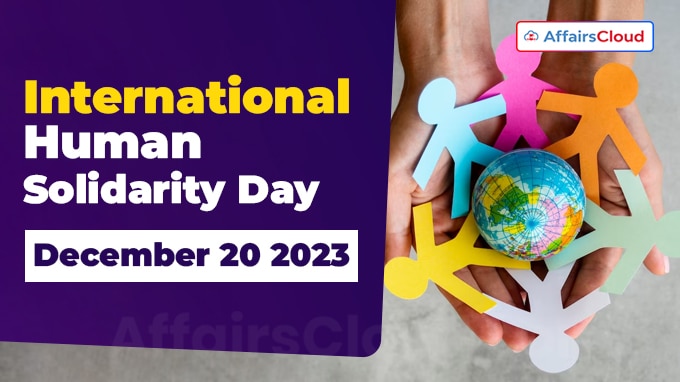 The United Nations (UN)’s International Human Solidarity Day is annually observed across the globe on 20 December to raise public awareness of the importance of solidarity in addressing global challenges such as poverty, inequality, and injustice.
The United Nations (UN)’s International Human Solidarity Day is annually observed across the globe on 20 December to raise public awareness of the importance of solidarity in addressing global challenges such as poverty, inequality, and injustice.
- The Day also aims to remind governments of all countries to respect their commitments to international agreements.
Background:
i.The UN Millennium Declaration”, adopted by the UNGA in 2000 identifies Solidarity as one of the fundamental values of international relations in the 21st Century.
- The declaration was adopted after the UN Millennium Summit on 8 September 2000.
ii.On 22 December 2005, the United Nations General Assembly (UNGA) adopted the resolution A/RES/60/209 and proclaimed 20 December each year as International Human Solidarity Day.
- The first-ever International Human Solidarity Day was observed on 20 December 2006.
Why December 20?
20th december marks the day on which UNGA adopted the resolution A/RES/57/265 to establish the World Solidarity Fund. The resolution was adopted on 20th December 2002.
World Solidarity Fund:
It was set up in February 2003 as a trust fund of the United Nations Development Programme (UNDP).
Objective: To eradicate poverty and foster human and social development, particularly among the most vulnerable populations in developing countries.
Significance of the observance:
- To celebrate our unity in diversity;
- To encourage debate on the ways to promote solidarity for the achievement of the Sustainable Development Goals (SDGs) including poverty eradication;
- Observed as a day of action to encourage new initiatives for poverty eradication.
Independent Expert on human rights and international solidarity:
i.It is one of the thematic special procedures overseen by the United Nations Human Rights Council(UNHRC).
ii.Purpose: To develop a draft declaration on the right of people and individuals to international solidarity.
iii.Duties: Developing further the guidelines, standards, norms, and principles related to the right to international solidarity.
Mandate:
The UN Commission on Human Rights (UNCHR) established the mandate of the Independent Expert on human rights and international solidarity in 2005 with Resolution 2005/55.
- The Human Rights Council extended the mandate in 2008 (Resolution 7/5), 2011 (Resolution 17/6), 2014 (Resolution 26/6), and 2020 (resolution 44/11).
Current mandate holder:
Cecilia M. Bailliet (Argentina) assumed her role as an Independent Expert on human rights and international solidarity on November 1, 2023.
About UN Human Rights Council:
The Human Rights Council replaced the former United Nations Commission on Human Rights.
President– Václav Bálek(Czech Republic)
Established in 2006
Members– 47 member states




